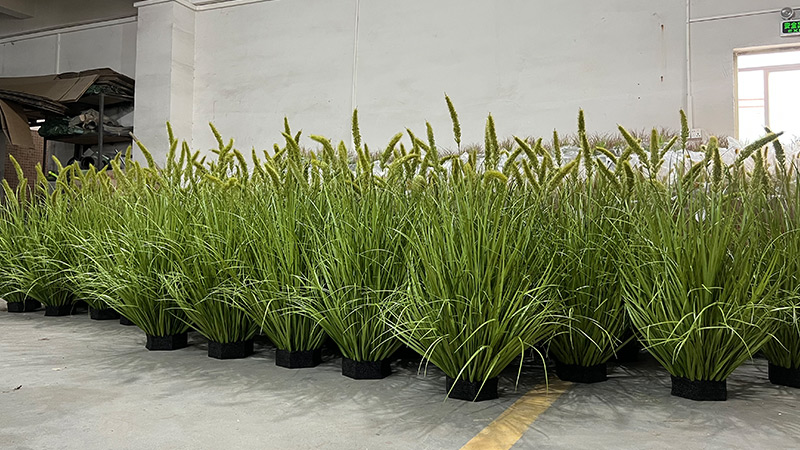Finding a reliable artificial plants supplier can be overwhelming. With so many options available, how do you ensure you're making the right choice? A poor decision could lead to low-quality products, supply chain disruptions, and dissatisfied customers.
To choose the best artificial plants supplier for your wholesale business, consider factors like product quality, pricing, minimum order quantities, lead times, customization options, and customer service. Prioritize suppliers with a strong industry reputation and a proven track record of reliability.
A good supplier is more than just a vendor—they're a business partner. By evaluating the right criteria, you can secure a supplier that helps your business grow and thrive.
1. Assess Product Quality
Compromising on quality can damage your brand reputation and increase return rates. But how do you determine the quality of artificial plants before placing bulk orders?
High-quality artificial plants should have realistic textures, natural color variations, and durable materials. Request samples and inspect key aspects like UV resistance, fire retardancy, and material composition.
Key Factors to Evaluate:
- Material: Premium artificial plants are made from PE, PU, or silk, ensuring a realistic look and feel.
- Color & Texture: Leaves should not look overly glossy or artificial. A natural matte finish is ideal.
- Durability: Ensure the products can withstand environmental conditions like sunlight and humidity.
- Certifications: Check for compliance with safety and environmental standards like REACH, RoHS, or UV protection1.
| Material Type | Features | Best For |
|---|---|---|
| PE (Polyethylene) | Flexible, realistic texture | Indoor & outdoor use |
| PU (Polyurethane) | Soft touch, more lifelike | High-end decor |
| Silk | Delicate, highly detailed | Indoor decorative use |
2. Compare Pricing and MOQ (Minimum Order Quantity)
Pricing plays a crucial role in profitability. However, the cheapest option isn’t always the best.
Balance cost with quality when selecting an artificial plants supplier. Ensure the pricing aligns with your target market and business model while considering MOQ requirements.
Questions to Ask:
- What is the price per unit at different order volumes?
- Do they offer discounts for bulk purchases?
- What is the MOQ, and does it fit your business size?
- Are there hidden costs (e.g., packaging, shipping fees, taxes)?
| Supplier Type | MOQ | Price Range |
|---|---|---|
| Large Manufacturer | 500+ pcs | Low to moderate |
| Mid-Sized Supplier | 100–500 pcs | Moderate |
| Small Wholesaler | 10–100 pcs | Higher per unit |
3. Evaluate Production Capacity and Lead Times
Fast-moving inventory requires a supplier who can keep up with demand.
A reliable supplier should have efficient production processes and reasonable lead times to prevent stockouts and delivery delays.
What to Look For:
- Manufacturing Capacity: Can they scale up if your business grows?
- Lead Time: Standard production time should be within 2–6 weeks.
- Order Flexibility: Can they handle urgent or custom orders?
- Shipping Options: Do they offer reliable logistics solutions?
4. Check Customization and Private Labeling Options
If you want to stand out, customization is key.
Choose a supplier that offers private labeling, custom designs, and branding options to differentiate your business in the market.
Customization Options to Consider:
- Custom Colors & Sizes: Some suppliers can tailor products to match specific client needs.
- Branding & Packaging: Ask if they provide branded packaging for a more professional look.
- Exclusive Designs: Some manufacturers offer custom mold development for unique artificial plants.
5. Analyze Supplier Reputation and Reliability
A supplier’s track record speaks volumes about their reliability.
Check reviews, request references, and verify their experience in the industry before committing.
Where to Research:
- Customer Reviews & Testimonials (Google, Alibaba, industry forums)
- Years in Business (A supplier with 5+ years in the industry is generally more reliable.)
- Response Time & Communication (Do they reply quickly and professionally?)
- Existing Client Base (Well-known retailers or brands using their products are a good sign.)
6. Understand Shipping, Logistics, and After-Sales Service
A good supplier isn’t just about delivering products—it’s about ongoing support.
Look for suppliers with efficient logistics, reliable shipping, and strong after-sales service to minimize risks.
Key Shipping & Service Aspects:
- Incoterms & Shipping Options: EXW, FOB, CIF2—understand what they offer.
- Delivery Time Estimates: Sea freight takes longer than air freight but is cheaper.
- Return & Replacement Policy: What happens if products arrive damaged?
- Customer Support: Do they assist with issues post-sale?
| Shipping Method | Speed | Cost | Best For |
|---|---|---|---|
| Air Freight | Fast | High | Urgent orders |
| Sea Freight | Slow | Low | Bulk orders |
| Express Courier | Fastest | Highest | Small test orders |
Conclusion
Choosing the right artificial plants supplier is critical for business success. Prioritize quality, pricing, production capacity, customization, reputation, and logistics. A strong supplier relationship can lead to long-term growth and a competitive edge in the market.

Hello everyone, I'm Li!By day, I'm a seasoned expert in the artificial plant industry, starting from the factory floor and working my way up to running my own successful business. In my free time, I’m passionate about running and often join trail runs with friends.Here to share what I've learned—let's grow together!









